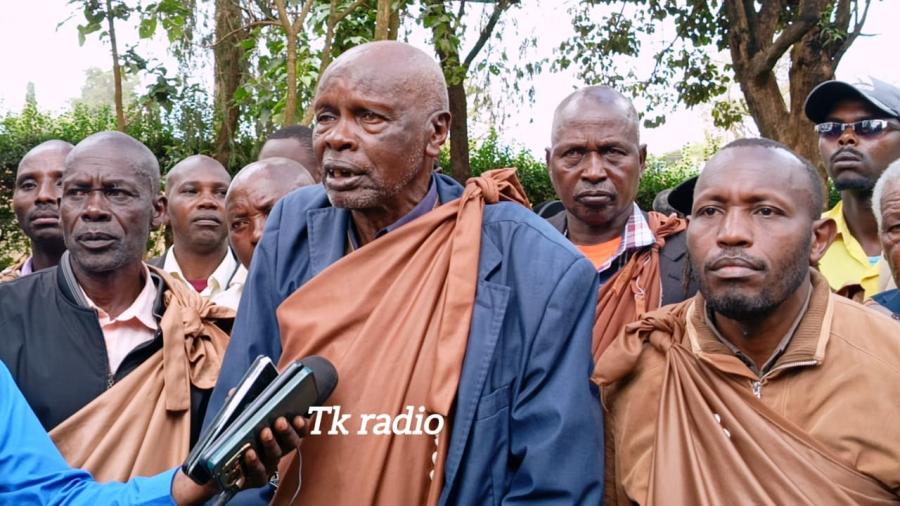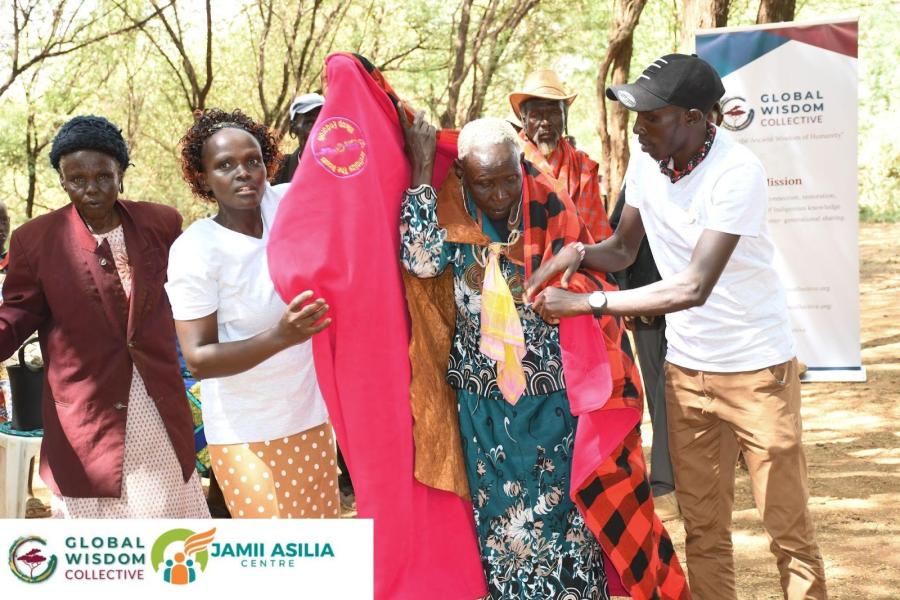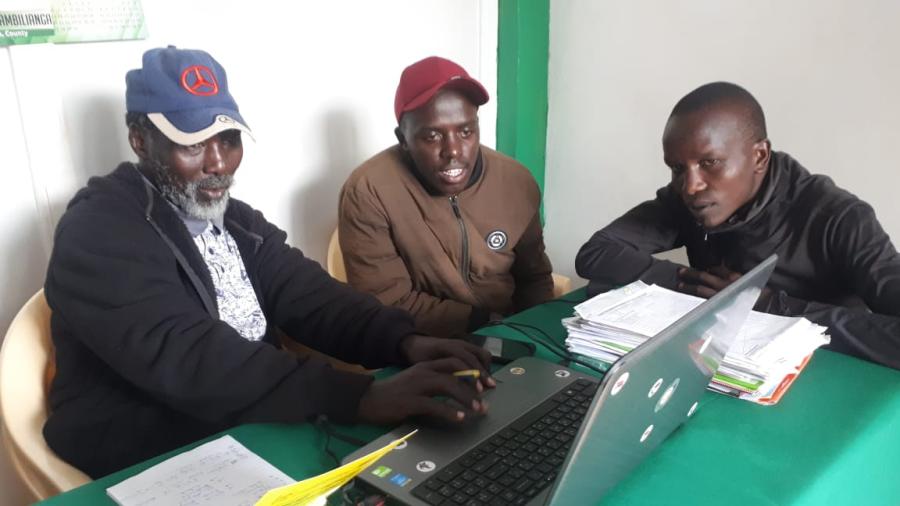Uncertainty, despair, and frustration hang over Magadi as the giant Magadi Soda Company, which has been harvesting 300,000 tons of soda ash annually from Lake Magadi since 1924, embarks on ambitious expansion and lease-extension plans amid local community protests.
Alleged company- and authority-sponsored intimidation and harassment of the local Maasai has shattered and almost entirely severed the Magadi community’s urge to fight for their rights. Magadi residents’ morale is in its lowest ebb ever.
Emakat is Maasai for the soda deposits in Lake Magadi, about 105 kilometers southwest of Nairobi. Even though the area, called Iloodokilani by the Maasai, is near Kenya’s commercial and administrative capital and endowed with the world’s largest source of tronar (the substance that produces soda used in glass manufacturing, steel industry, and common salt production), according to the 1999 district development plan the Magadi region has the highest poverty incidence in Kajiado District. The division, with an estimated population of about 28,200, has the lowest population in Kajiado thanks to dry weather and acute water shortages.
Before electrification of the Magadi Soda Company operations, wood was the main source of energy, leading to deforestation of the Iloodokilani area. No reforestation efforts were ever made and erosion has further degraded the soil, affecting growth of grass on which livestock thrive. Unlike soda extraction at Lake Natron in Tanzania, where local Maasai extract and sell slabs, Magadi Maasai are not allowed to trade this commiodity. Soda is used locally by tobacco chewers, for livestock salt licks, and in homes.
Dubious Negotiations
Information on the ground suggests that there is more to the harassment issue than meets the eye. Magadi Maasai representatives who have been locked out of negotiations said that Magadi Soda Company has been busy fine-tuning the lease renewal deal behind the community’s back. The company is reportedly seeking funds from the World Bank through the International Finance Corporation (IFC) to put up a second phase of the soda mining plant at Magadi. Community members concede that they were initially involved in the lease extension discussions but say that the process was hijacked at some point by influential interested parties. Negotiations with the community were shelved, and local leaders and individuals opposed to this turn of events were targeted by the company and its cronies for harassment and victimization, Magadi Maasai representatives and a former area councillor reported.
On November 28, 2003, Kenya’s General Service Unit (GSU) and police, called in by Magadi Soda security, tear-gassed about 300 Maasai commuters who had crammed into a train coach, community leaders reported to area non-governmental organizations. In the melee that ensued, three pregnant women miscarried while others suffered broken limbs and sustained various injuries. The community planned a counterstrike and protesters allegedly beat several company employees. The company’s managing director, community representatives said, asked for three days to respond to the grievances raised by the community and promised disciplinary measures against the hostile security employees. But Magadi community members say the managing director only spoke with three “leaders” who locals have said do not truly represent the Magadi community.
It is not uncommon that Maasai leaders throughout Maasai land side with where the money is on resource-based issues, either through financial compromise or patronage. Many powerful leaders have financial stakes in such companies and others fear losing their jobs. Many also fear being seen as opposing government development goals. Unconfirmed reports from Magadi community members speaking on condition of anonimity have said that bribery has taken place, with each civic leader in Kajiado district pocketing about U.S. $600 for sanctioning the lease extension at the county council level.
In order to protest the tear gassing and the Magadi leaders’ misrepresentation, Magadi locals pulled apart a section of the railway line in November 2003 to block the soda company’s train from passing through their land.
In response, community representatives said, during a meeting in Ngong leaders opposed to the community’s rejection of the soda company resolved to dispatch the GSU personnel and Administration Police (AP) to arrest those keeping vigil at the railway blockade. The Ngong meeting allegedly identified 19 Magadi residents perceived to be vocally opposed to the soda company’s lease renewal process and targeted them for arrest, although the accused—including a former civic leader who has been opposed to the lease extension process—said they never took part in dismantling the rail line. On November 29, 2003, the joint GSU and AP force rounded up those involved in the blockade. Thirty were charged with vandalizing the railway line, with damage valued at Ksh 300,000.
According to community members, the blockade arrests occurred under the supervision of a local Maasai chief and lasted two weeks, leaving residents harassed and intimidated. A delegation of Maasai representatives approached Minister of Education George Saitoti, their local member of parliament, seeking his intervention and the release of those who had been arrested, but the representative reportedly insisted that in exchange, individuals spearheading the demand for community rights in the deal surrender to police. The delegation is said to have refused to sacrifice any of their sons, and hence those arrested at the railway remained in prison for close to six months. The majority were released in April after the Magadi Support Group mobilized lawyers and raised funds.
The Maa Christian Council, Centre for Minority Rights Development, Neighbors Initiative Alliance, Dupoto E Maa, and Maa Pastoralists Development Organization have joined together as the Magadi Support Group and have embarked on a double-pronged legal battle to fight for the Magadi community. Thus far, the group has filed two court cases, one seeking justice for the people arrested and the other seeking to stop the Magadi Soda Company lease renewal process.
In his inauguration speech, Kenya’s President Mwai Kibaki said, “It would be unfair to Kenyans not to raise questions about certain deliberate actions or policies of the past that continue to have grave consequences on the present.” The National Rainbow Coalition (NARC) government promised to “chart a common path and create an enabling environment for citizens to fulfill themselves in life.” By demanding to be fully involved in the Magadi Soda Company lease renewal and the soda plant expansion process, the Magadi Maasai are seeking to fulfill themselves in life as stakeholders.
Magadi Soda Company employees who spoke under the condition of anonymity revealed that they have also been at loggerheads with company management, particularly regarding harsh working conditions, poor medical coverage, lack of employment opportunities for local Maasai residents, and lack of water provisions, education financial assistance, and security. They also accused the company of nepotism, alleging it courts local leaders and some families at the expense of the larger community. Magadi residents said that the company has ferried workers from as far as Ong’ata Rongai, approximately 90 kilometers away, to jobs that could be taken by locals.
World Bank Involvement
World Bank policies outline a set of principles to be incorporated into Bank-operated work affecting indigenous peoples, as well as the roles and responsibilities of Bank staff, borrower countries, and private sector companies such as Magadi Soda Company. The Bank policy’s main objective toward indigenous peoples is to ensure that development happening on indigenous peoples’ lands fosters full respect for their dignity, human rights, and cultural uniqueness. More specifically, in the context of operations that the Bank finances, the objectives are:
- To identify, in consultation with indigenous peoples, their development needs and aspirations
- To provide enabling conditions for indigenous peoples to participate in the planning, implementation and evaluation of these operations
- To avoid or minimize potentially adverse effects of Bank-financed operations on such groups
Should the World Bank fund Magadi Soda Company, Magadi locals say it will violate its own policies. The World Bank has not made any official statement on the matter, and the Kenyan government appears determined to allow the project to go on, claiming Magadi Soda Company has one of the best private infrastructures in Africa and contributes immensely to the national economy.
Since the arrival of the soda company, the mood in and around Magadi has been despondent. According to one local elder speaking on condition of anonymity, “residents of the area have been doing their things and surviving by the grace of Enkai [God].” The man added that from the time the company’s structures were placed in Magadi, “we have been condemned to the process of dying a little every day.” He echoed the World Bank’s policy objectives, which recognize that indigenous peoples are commonly among the poorest segments of society and have barely benefited from development policies and programs.
According to the 2002 World Summit on Sustainable Development brief by the Centre for International Environmental Law, “Sustainable development is unlikely to ever be attained in any locales if the property rights of indigenous and other local communities remain unrecognized by national and international law.” International Labor Organization Convention 169 on indigenous and tribal peoples provides in Article 3(1) that “indigenous and tribal peoples shall enjoy the full measure of human rights and fundamental freedoms without hindrance or discrimination.” The convention further states in Article 4(1) that “special measures shall be adopted as appropriate for safeguarding the persons, institutions, property, labor cultures and environment of the people concerned.” Communities such as the Iloodokilani should be empowered and the right to manage and control their natural resources upheld by the Kenyan constitution.
The situation confronting the Magadi Maasai today emanates from economic exploitation of African resources and investors’ refusal to share the benefits. This plunder of Maasai peoples’ resources in order to meet the profitability requirements of outsiders contradicts the NARC regime’s promise to “make laws and policies for the general good of the people and to safeguard them against internal and external exploitation.” Many Maasai throughout Kenya now wonder whether their brethren in Magadi fall in the category of said “people” and if so, why they have continued suffering exploitation, intimidation, and harassment long after the NARC government took power.
The Need for Government Intervention
It is tragic that a country with the diversity, wealth, and exuberance of Kenya does not share those attributes with its communities. The Kenya government should create an enabling environment for true bottom-up development by stressing a popularly based development strategy that includes a review of policies and legislation and the creation of conducive working conditions in its plant. There is also need to reform land tenure and resource rights so they are based on traditional systems of ownership, with guaranteed security of access to land to encourage proper management of resources by locals.
“It will take moral convictions to fight the system where money is everything,” one elder said, even though he was visibly resigned to the poverty he sees as his fate. The battle lines are drawn on the Magadi issue and this legal tussle will be one of many the Maasai have waged in the fight for rights to their lands and resources. It has been nearly a century since they filed a lawsuit in the famous Ole Lenchoko land case of 1913, the first Kenyan community to sue the British. The Maasai look with optimism to a time when the policies of lifting people up will replace the prevailing policies of pressing them down.
Michael Tiampati is a Maasai journalist.



